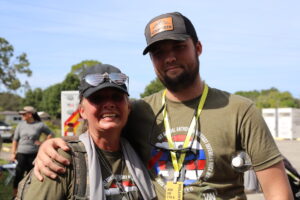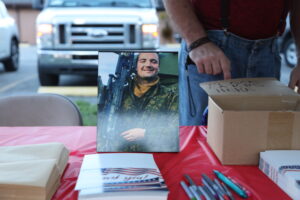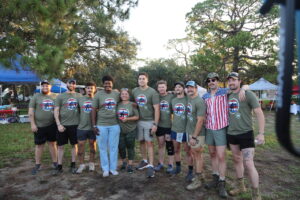 Tanya’s son, Marine Anthony Patrick Muhlstadt, took his own life.
Tanya’s son, Marine Anthony Patrick Muhlstadt, took his own life.
It happened one day in late November 2021 while he was stationed at Twentynine Palms in California.
In a mom’s attempt to find understanding and comprehension, she turns to Anthony’s peers.
“They all described Anthony as a Marine’s Marine; he was the tough guy. Anthony was the last person they would’ve ever thought would do something like that. He was going to be a lifer. He was a Marine, he lived and breathed the Marine Corps,” Tanya says.
I am sitting beside Tanya on a beautiful, breezy day at a restaurant alongside the coast of Tampa Bay. Tanya’s smile and laugh are infectious most days. Today, I am asking hard questions that resurface the pain that is always there just under the surface.
Tanya is my friend. I have come to know her through her volunteer work in many local organizations and through her efforts to honor Anthony.
I was proud to support her first-annual Anthony Muhlstadt Defender Ruck Walk in June of 2023, which raised more than $20,000 in the fight against military suicide.
Now, Tanya is well into the planning for the second-annual event that will be held in her hometown of St. Petersburg, Florida, in June of this year.
The events raise money for the Stop Soldier Suicide Organization, an organization she wishes she had known about before.
Tanya does not spend her life in darkness or dread. She commits most of her free time to the service of others. She has managed to find a level of peace, but not closure. There are still so many unanswered questions and guilt … so much guilt.
Our conversation takes Tanya back to her young son, who started talking about serving his country as early as second grade, writing, “When I grow up, I want to fight for my country and defend the America.”
 The anguish is still there as she shares, bewilderingly, “You know what? It was a perfect storm.”
The anguish is still there as she shares, bewilderingly, “You know what? It was a perfect storm.”
Anthony wanted to re-up and go to Twentynine Palms from Camp Lejeune. The family tried desperately to talk him out of it, but that is where he wanted to be. Anthony knew that Twentynine Palms was where the Marine Corps was pulling troops for deployments to Afghanistan, and Anthony wanted to be a part of that; he wanted to go into combat.
A mom can pick apart the time leading up to a tragedy like this, trying to find the reasons why her son took his own life. Tanya refers to the perfect storm that included many things: a girl, COVID-19, isolation, peer pressure, and toxic leadership.
One of these things alone could probably have been dealt with, but the combination of various triggers proved too much for Anthony. Now Tanya knows that even if someone has people who love them, close family, and friends who support them, they can still feel alone.
“Anthony used to call me when he had bad days or nights. He’d call at three o’clock in the morning. It didn’t matter what time. I would spend time talking with him and allow him to vent. He would say, ‘You know what, Mom? I always feel better after I talk to you. Thanks, Mom.’ That was our thing.”
Tears well in Tanya’s eyes, “For him not to call that one time, it’s like, what the hell?”
Anthony had disclosed challenges to his mother. He had shared the heartbreak of a disloyal girlfriend, the isolation of being at Twentynine Palms without a vehicle, the fact that he had missed ranking up by mere points, and his challenges with some of his peers.
Anthony had arrived at Twentynine Palms with Advanced Machine Gunner School under his belt. Leadership wanted to make him a vehicle commander immediately, and some of his equal-ranked peers did not like that, giving Anthony a hard time.
Tanya had suggested that Anthony speak to a Chaplain or find a counselor, but Anthony wasn’t having any of that. Instead, the family found a trusted therapist who lived in North Carolina and had weekly Zoom meetings with Anthony to work through challenges.
Forgiveness is hard. There are some individuals who were at Twentynine Palms with Anthony that Tanya hasn’t been able to forgive. There is still anger there.
She remembers calls from Anthony describing incidents with people he thought were his friends. It was uncomfortable for Anthony, and Tanya heard the anguish in her son’s voice as he explained things that had happened or that had been said.
The attacks weren’t only verbal. During a Facetime video call with Anthony, Tanya discovered Anthony had a black eye, but he wouldn’t go into detail about what had happened. Later, Tanya learned Anthony had been jumped by three Marines in retaliation for Anthony taking up for a Junior Marine who was being harassed.
Anthony’s time at Twentynine Palms was hard, and Tanya wonders where command was when these things happened. Anthony had great relationships with Junior Marines at Lejeune, but it was a different story with his peers at Twentynine Palms.
“That still breaks my heart,” says Tanya.
Tanya was aware that Anthony was not in a good place. She had asked her son to talk to a chaplain, telling him, “Thomas (the counselor in North Carolina) is many states away, so go to the chaplain, Anthony. You’ve got to talk to somebody there.”
That is where the guilt comes in for Tanya.
“Anthony goes to the base psychiatrist, who spends a mere 45 minutes with him and who puts him on Prozac immediately. I didn’t know he was on Prozac, but when he would call, he would complain about how tired he always was. When I finally learned he was on Prozac, I warned him not to drink alcohol while taking it. He said, ‘Yes, Mom, yes, yes, yes.’”
Just ten days before Anthony’s death, Tanya had visited her son at Twentynine Palms. She had gone to visit and to help Anthony pick out a car.
“He was finally getting a car to get off base and do his own thing. He was so happy. We had a beautiful time,” explains Tanya. “I even got him to go hiking with me, even though he complained that hiking is what he does for a living.”
It was almost time for Anthony’s six-week follow-up appointment with the base psychiatrist. Tanya reminded Anthony to tell the psychiatrist about being tired all the time.
Later, Tanya learns that Anthony had told the psychiatrist that he was feeling better at that visit, and as a result, his risk assessment was lowered. But, for some reason, his prescription strength was increased.
That was on Wednesday, and he died on Friday.
Anthony’s friends shared that they had spoken to him that day. It was right before Thanksgiving, and everyone was getting ready for leave.
Tanya was told that Anthony had reached out to his friend Dockery, explaining that he would be leaving town for the holiday, and asked if he could drop off his gun for safekeeping. It was a weapon he was not supposed to have in the brigs. However, Dockery was in Las Vegas and wouldn’t return until the next day.
“Dockery had asked Anthony if it could wait until he returned, and Anthony told him, yeah, no problem,” explains Tanya.
After that, Anthony went shopping at a few locations to pick up a trigger lock for his weapon along with batteries, deodorant, and other items for his trip. Anthony planned to visit his girlfriend in North Carolina before returning to Florida and his family for the holiday.
That evening, however, he spoke with his girlfriend, and the two had argued and broke off the relationship. What happened next, in those moments before Anthony took his own life, we will never know.
Tanya’s anguish is evident, “Well, when somebody finally says, okay, I’ll talk to someone, and all they get is increased medication, they feel hopeless.”
The perfect storm: hopelessness, helplessness, loneliness, isolation, and sadness.
Tanya went to Twentynine Palms to gather evidence about Anthony’s death once it was released. She was on a mission to speak with Anthony’s commander and the doctor who had seen him.
She felt his command had turned a blind eye to the relentless harassment Anthony had been dealing with.
For the doctor, simply, “Why? Why did you increase his medication and not alert command?” Tanya could not understand how a person who has been diagnosed with severe depression could be left to hold a position of authority as vehicle commander.
“I didn’t want him to be stripped of his duties, but I felt there was some obligation to share the concern with his command. As the command was in close personal contact, they could have held a room sweep to locate any weapons or contraband.”
The Doctor explained, “We are on a tightrope. They get angry if we disclose, and there is anger if we do not.”
When asked about suicidal ideation and potential weapons in Anthony’s possession, the doctor explains, “Well, he (Anthony) said he didn’t have any weapons.” And, as to why Anthony’s medication was increased, “Anthony said it was a good idea,” the Doctor says.
Tanya laments, “I know my son. He would never have admitted he had a weapon, and he would have thought increasing his medication would help him get better faster. But that was not a decision Anthony should have made. He is not a doctor.”
It is a perfect storm.
- Limited Resources. “There is a waiting list to see those guys (counselors/psychiatrists). They’ve been trying to get more counselors to these particular bases, like Alaska, which are higher-risk areas. They can’t find people to get out there. There is a huge need for healthcare workers on these bases, and they can’t find them,” explains Tanya.
- Impersonal Treatment. Asking for help is a huge step in the military, considering the consequences to career and reputation. When someone does take that step, there must be a better way to serve a person’s mental health than simply speaking with them for a few minutes, handing them a prescription and saying, “See you in six weeks.”
- Peer Experiences. Says Tanya, “Sam, a friend and fellow Marine of Anthony’s, came for Anthony’s funeral. He was already out of the military. Sam had sought help while on Active Duty, and they (the Military) had pushed him out and messed up his DD214 under medical or mental health or something. Sam told me at Anthony’s funeral, “Maybe if he would’ve gone sooner, sought help sooner, he’d still be here. But he’s not. He didn’t because of me. He watched what happened to me.”
- Disclosure vs. Nondisclosure. No protocol works to alert command when someone is mentally at risk for fear that the patient’s career will be jeopardized. But, if the command knows they have someone at risk, they can implement action that does not isolate a person, like health & safety sweeps, to ensure there are no weapons in the barracks.
The Fine Line
An answer must come. We must figure it out.
What do you do in a case like this? Maybe you don’t just dump service members; kick them out of the military when they have disclosed mental health challenges. Perhaps they can’t do the job they’re in right now, maybe that is true. But there has to be something else that can happen that doesn’t strip them of their careers or put a giant label on them that results in scrutiny and ridicule.
 If a person is diagnosed with a mental health issue, there should be ongoing counseling, not just a prescription, and there should be a team effort between the doctor and the commander to protect the person.
If a person is diagnosed with a mental health issue, there should be ongoing counseling, not just a prescription, and there should be a team effort between the doctor and the commander to protect the person.
For Tanya, there is no way to change what happened on that November 2021 day. Now, she spends time with her son in her garden each morning, where they feed the birds together. She speaks to him, and she knows he is listening, helping to guide her to make change for active duty service members in our armed forces.
“There are a lot of great programs for veterans, but I want to make sure our active duty service members get the support they need as well,” says Tanya.
Tanya remains in close contact with many Marines who served with Anthony at Camp Lejeune. She works tirelessly to find and support organizations that concentrate on the health and well-being of active-duty service members.